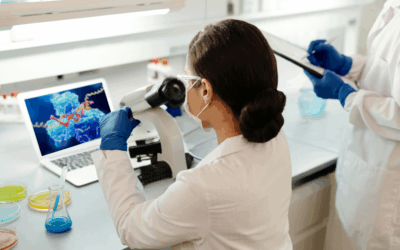In vitro ADME assays provide the data necessary to ensure the safety and efficacy of your drug candidates. Automating these tests can shorten the time it takes your product to reach the market.
In vitro ADME testing assesses how drugs are absorbed, distributed, metabolized, and eliminated. These assays determine a drug’s pharmacokinetics and drug-drug interaction potential, allowing researchers to make informed decisions in preparation for clinical trials.
Traditionally, the in vitro ADME process involves pipetting reagents, test compounds and other samples into the wells of microplates. These plates are then incubated under specific conditions before being transferred to analysis platforms. The process is labor-intensive and largely manual in nature, causing variability in results.
RELATED: A Guide to In Vitro ADME Testing in Drug Development
Automated liquid handling workstations are a more precise and efficient testing method than manual assay loading.

Automatic Liquid Handling Station at WuXi AppTec
These workstations utilize robotic platforms to handle sample addition, gradient dilution, and liquid distribution, speeding up the testing process while minimizing the risk of human error.
RELATED: How Laboratory Automation Improves Timelines and Accuracy
In vitro ADME testing automation provides three distinct advantages, accelerating your candidate’s path to market.
#1. Higher Throughput
Throughput is the rate a system can process a certain amount of work or data within a given time period. Higher throughput indicates the ability to quickly and efficiently handle a large number of samples or tests.

Higher Throughput In Vitro ADME Assays
Automated liquid handling workstations achieve higher throughput by continuously running full-process assays. Equipped with multiple pipetting channel heads, these workstations can handle multiple assays at the same time, allowing for rapid screening and analysis.
This capability enables researchers to accelerate the drug discovery process and conduct more extensive testing in a shorter time frame. Consequently, this automation boosts productivity and efficiency in laboratory workflows.
RELATED: Innovations in Drug Development: Increased Utility of In Vitro Testing
#2. Higher Precision
Precision is the ability to accurately perform various tasks, including measurements, analyses, and experimental procedures. High precision ensures that processes are reliable and reproducible, meaning that the results obtained from multiple repetitions of the same experiment are consistent with each other.

Precise Measurements of Reagents & Test Compounds
Automated liquid handling workstations ensure high precision in testing. These workstations accurately dispense reagents, test compounds, and biological samples in precise volumes. By reducing errors in volume concentration, they contribute to the reliability of test outcomes. Real-time data capture and recording also minimizes the risk of transcription errors that may occur when manually documenting experimental data.
Experimental precision directly impacts the quality and reliability of test results. Enhanced data quality resulting from precise experimental procedures leads to increased confidence in the validity of the findings. This, in turn, supports robust decision-making throughout the drug development process, as researchers can rely on accurate and consistent data to inform their next steps.
#3. Better Reproducibility
Reproducibility is the ability to consistently generate similar results while performing a test multiple times. Improved reproducibility ensures that findings can be accurately replicated and verified, enhancing the validity of test outcomes. This validity is crucial for making informed decisions during drug development, as it enables scientists to confidently assess the efficacy of drug candidates.
Automated testing platforms improve reproducibility by minimizing variability and errors across assays. These systems precisely control experimental conditions, such as temperature, pH, and timing.
Integrated pipetting platforms accurately dispense reagents and samples in exact volumes, reducing the likelihood of measurement errors. By eliminating manual handling and procedural inconsistencies, automation enhances the reproducibility and accuracy of in vitro ADME testing. This leads to more reliable and informative results for drug development, speeding up the discovery process.
Conclusion
Automatic testing is crucial in the in vitro ADME process due to its efficiency advantages. Reduced time overhead expedites the research process, allowing for a larger number of samples to be assessed in a shorter time frame.
Liquid testing workstations also ensure consistent and reliable assay completion, with a high level of precision. This reduces the potential for human error associated with manual pipetting and sample handling, improving accuracy and integrity.
WuXi AppTec DMPK has spearheaded advancements in automation, laying a robust foundation and establishing a high-throughput integrated platform for in vitro ADME. This initiative has not only enhanced delivery efficiency but also improved the quality of results, underscoring the significance of automation in accelerating drug development processes.
WuXi AppTec offers comprehensive in vitro services that give you quality data needed to predict a compound’s pharmacokinetics. Our in vitro ADME assays are versatile, catering to various stages of drug development. Whether you’re working with small or large molecule candidates, our assays can be customized to meet the specific requirements of your program.
As a global company with operations across Asia, Europe, and North America, WuXi AppTec provides a broad portfolio of R&D and manufacturing services that enable the global pharmaceutical and life sciences industry to advance discoveries and deliver groundbreaking treatments to patients. Through its unique business models, WuXi AppTec’s integrated, end-to-end services include chemistry drug CRDMO (Contract Research, Development and Manufacturing Organization), biology discovery, preclinical testing and clinical research services, helping customers improve the productivity of advancing healthcare products through cost-effective and efficient solutions. WuXi AppTec received an AA ESG rating from MSCI for the fourth consecutive year in 2024 and its open-access platform is enabling around 6,000 customers from over 30 countries to improve the health of those in need – and to realize the vision that “every drug can be made and every disease can be treated.”


